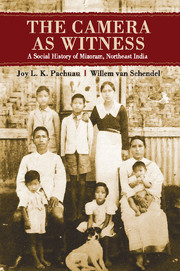Book contents
- Frontmatter
- Contents
- List of Figures
- List of Maps
- Acknowledgements
- I Becoming Mizo
- 1 Introduction
- 2 Coming into View: The First Portraits
- 3 Adjusting Mizo Culture
- 4 Domesticating a New Religion
- 5 Getting Educated
- 6 Controlling the Hills
- 7 The Trouble of Travel
- 8 First Stirrings of the Market Economy
- 9 Mizos in the World Wars
- 10 Mizo Visual Sensibilities
- II Mizoram in the New India
- III Visions of Independence
- IV Mizo Modernities
- Copyrights and Sources
- Glossary
- Bibliography
- Index
3 - Adjusting Mizo Culture
from I - Becoming Mizo
Published online by Cambridge University Press: 05 May 2015
- Frontmatter
- Contents
- List of Figures
- List of Maps
- Acknowledgements
- I Becoming Mizo
- 1 Introduction
- 2 Coming into View: The First Portraits
- 3 Adjusting Mizo Culture
- 4 Domesticating a New Religion
- 5 Getting Educated
- 6 Controlling the Hills
- 7 The Trouble of Travel
- 8 First Stirrings of the Market Economy
- 9 Mizos in the World Wars
- 10 Mizo Visual Sensibilities
- II Mizoram in the New India
- III Visions of Independence
- IV Mizo Modernities
- Copyrights and Sources
- Glossary
- Bibliography
- Index
Summary
Colonial annexation meant that the hill people were now ruled from the plains – an entirely new experience for them. The first few decades after 1891 brought serious self-reflexion and reorientation. They had to adapt to new overlords, new political institutions and new procedures. But most of all, they had to come to a new understanding of their place in the world. This required vigorous cultural adaptation.
They stood at a fork in the road: would they find inspiration for cultural innovation in the models offered by their neighbours in the plains? Or would they reject these and strike out in another direction? They chose the latter path. This was not self-evident. Although the early literature stresses inimical relationships and fear between hill and plains people, there were many longstanding friendly contacts between them as well, notably by means of trade in salt, rubber, cotton, tobacco, fruits, wax and guns. People from the plains sometimes sought and were given refuge in the hills: British sources reported on subjects from the plains fleeing to the safety of the hills and taking part, alongside Mizos, in raids on the plains. Some hill people had adopted cultural forms from the plains, such as elements of Hinduism (among the Bru) and Buddhism (among the Chakmas), but the Mizos had hardly done so. Therefore, for them, adapting to plains models would have been a cultural revolution. They distinguished clearly between themselves and vai – their term for people from the plains, later extended to denote foreigners. Nevertheless, there are indications that some Mizos had an interest in ‘plains models’. For example, an early Mizo Christian newspaper article warned:
Some Mizos are envious of the Hindu customs and really appreciate them. Hindu customs, especially Assamese customs, are something that they really appreciate, when it is better for them to appreciate that of their own kind. When the Hindus call them names and say, ‘Mizos who eat beef,’ they regret becoming Hindu. Some of them even say, ‘we are born once, if only we were born as vai’.
- Type
- Chapter
- Information
- The Camera as WitnessA Social History of Mizoram, Northeast India, pp. 36 - 58Publisher: Cambridge University PressPrint publication year: 2015

